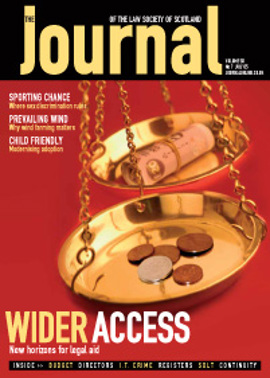Scottish Solicitors' Discipline Tribunal

DERYCK DE MAINE BEAUMONT
A complaint was made by the Council of the Law Society of Scotland against Deryck De Maine Beaumont, Solicitor, Balnaguard, Pitlochry (“the respondent”). The Tribunal found the respondent guilty of professional misconduct in respect of his failure to respond to the reasonable enquiries of the Society about three separate complaints; his failure to obtemper a number of statutory notices served upon him by the Society; his unconscionable delay in settling the account of a firm of solicitors for which he was responsible; his unconscionable delay in replying to the reasonable requests of that firm for information about payment of the account due to them and the reasons for delay in payment. The Tribunal censured the respondent and fined him in the sum of £10,000.
The Society has a duty to investigate any complaint with regard to conduct of a solicitor and a solicitor has a duty to respond to any enquiries which are made by the Society. In this case not only did the respondent fail to respond to the Society in relation to three separate matters but he also failed to respond to various statutory notices issued to him. The respondent also delayed in meeting another firm’s fees and delayed in responding to correspondence from a firm of solicitors.
There were certain matters in the complaint which were deleted by the fiscal. No finding of misconduct was made in respect of delay in responding to correspondence from the Society in respect of one of the clients. The Tribunal however noted that the respondent had two previous findings of professional misconduct from 1998 when he had been censured and fined £5,000 and £2,000 respectively. The present failures occurred over a period from 2000 to 2003 and the Tribunal considered that this was a continuing course of action and therefore regarded the case as very serious in that context. The Tribunal considered restricting the respondent’s practising certificate but took into account that the respondent is a sole practitioner in a rural area and that he may find it impossible to continue in practice with a restricted practising certificate. The Tribunal accordingly considered that a substantial fine was merited.
ALAN JACKSON
A complaint was made by the Council of the Law Society of Scotland against Alan Jackson, solicitor, formerly of 28 Swift Brae, Livingston, West Lothian and now of 14 Barn Place, Livingston, West Lothian (“the respondent”). The Tribunal found the respondent guilty of professional misconduct in respect of his breach of rules 6, 8, 9, 10 and 24 of the Solicitors (Scotland) Accounts etc Rules 2001, his breach of rule 7 of the Solicitors (Scotland) Professional Indemnity Insurance Rules 1995, his failure or unreasonable delay in recording deeds timeously and his failure to respond timeously, openly and accurately to the reasonable enquiries made of him by the Law Society. The Tribunal censured the respondent and directed in terms of section 53(5) of the Solicitors (Scotland) Act 1980 that any practising certificate held or to be issued to the respondent shall be subject to such restriction as will limit him to acting as a qualified assistant to, and to being supervised by, such employer or successive employers as may be approved by the Council of the Law Society of Scotland for an aggregate period of five years.
The Tribunal considered that the respondent’s breaches of the Accounts Rules together with his failure to have professional indemnity insurance, his delay in recording deeds and failure to respond to the Society clearly amounted in cumulo to professional misconduct. The Tribunal noted that no-one had been damaged by the respondent’s failure, but there was a potential for damage especially in connection with the lack of indemnity insurance and the delay in recording conveyancing deeds. The Accounts Rules and Professional Indemnity Rules are there to protect the public and failure to comply is damaging to the reputation of the profession. The Tribunal however noted the respondent’s past history and the difficulties that he had encountered. The respondent was clearly trying to do his best, had realised that he could not continue as a sole practitioner and had taken steps to transfer his business. The Tribunal considered that the respondent required to work under supervision and imposed a restriction on his practising certificate for an aggregate period of five years to ensure that he gains experience by working under supervision.
WILLIAM MICHAEL LEWIS
A complaint was made by the Council of the Law Society of Scotland against William Michael Lewis, 1 Hope Park Terrace, Edinburgh (“the respondent”). The Tribunal made no finding of professional misconduct against the respondent and ordered that there be no expenses due to or by either party.
This case concerned failure to reply to another firm of solicitors and to the Society. In this case the Tribunal accepted the respondent’s position that he delivered all that was required of him at settlement and that the purchasing solicitors had already seen and approved the deed of servitude and there was accordingly no obligation on the respondent after settlement to sort matters out. The respondent did however say that he would sort matters out and the Tribunal had to consider whether or not his delays and failures to reply to the purchasing solicitors with regard to the deed of servitude were so serious and reprehensible as to amount to professional misconduct. The Tribunal found it understandable that the respondent give priority to matters which he was under an obligation to his clients to deal with expeditiously. In this case the respondent had not failed to perform an obligation, but had failed to help when he said that he would. The respondent had also eventually obtained an amended deed which then required further amendment. In connection with the failure to reply to the Society the Tribunal could not be satisfied beyond reasonable doubt that the first letter had been received by the respondent, and the respondent did reply not long after the second letter. In the whole circumstances the Tribunal did not find that the respondent’s conduct amounted to professional misconduct, but the Tribunal would not wish to associate itself with this type of conduct and considered that the respondent’s failures to respond were unprofessional. The Tribunal also considered that the respondent had no-one but himself to blame for having been charged with professional misconduct and accordingly the Tribunal did not make an award of expenses against the Society.
In this issue
- Commissioner: Public Authorities must do more
- Supporting legal aid
- No country cousins
- Making the money go further
- Adopting a new approach
- Gordon giveth and Gordon taketh away
- A blow for the future
- A Wie hint of change?
- Raising the bar
- The IT crimewave
- The directing mind
- Going through the motions
- Planning in the park
- Always look on the bright side
- Scottish Solicitors' Discipline Tribunal
- Website reviews
- Book reviews
- The race to the registers revisited
- SDLT: getting it right
- SDLT: barcoding
- Business sense






